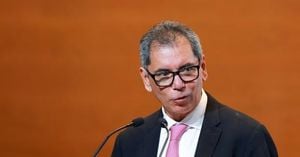Thailand is on the brink of a significant shift as it prepares to appoint Kittiratt Na-Ranong, the former Finance Minister, as the new chairman of the Bank of Thailand (BOT). This appointment signals the government’s intention to reinforce its influence over the central bank amid increasing tensions surrounding monetary policy and inflation control.
According to reports, the selection was made following a nearly five-hour meeting of the committee responsible for appointing the central bank's leadership. Information gleaned from several sources close to the proceedings revealed Kittiratt as the chosen nominee. Though the final decision awaits endorsement from both the cabinet and the monarchy, the expectations lean heavily toward approval of Kittiratt, known for his previous role as deputy premier.
Sathit Limpongpan, who led the selection panel, confirmed the decision without disclosing names, hinting at the cautious approach taken during this politically sensitive process. Despite the lack of immediate comment from government officials, Kittiratt’s candidacy raises questions about the future independence of the BOT.
The newly appointed chairman, if his confirmation proceeds smoothly, will have considerable sway over monetary policy decisions. While he does not directly dictate monetary policy, he plays a key role in shaping the Monetary Policy Committee and can influence discussions on the interest rates, which could lead to more aggressive rate cuts than previously anticipated.
Notably, Kittiratt has been outspoken against the BOT’s previous hawkish stance, criticizing the central bank for not doing enough to stimulate economic growth when he served as an economic adviser. His appointment is particularly relevant, as the Thai economy has been stagnated, with growth figures showing only 1.9% expansion last year.
Pushing aside the cautious responses from the BOT, the new government, led by Prime Minister Paetongtarn Shinawatra, seems insistent on prioritizing economic stimulation through reduced interest rates. The administration has taken steps to distribute funds to the most vulnerable populations and has allocated higher budgets for the upcoming fiscal year to invigorate the economy.
Former Bank of Thailand governors and economists have expressed serious concerns about the potential political interference arising from Kittiratt's likely appointment. They fear the government's candidate could prioritize short-term political interests over the long-term economic stability of Thailand. Their fears were articulated by over 800 economists who signed an open letter warning about the risks posed by political affiliations at the central bank.
This mood of dissent echoes throughout economic circles as the BOT stands firm on its inflation target, reiteratively opting for caution over drastic cuts which have been demanded by the government. Just last month, the BOT reaffirmed its inflation target of between 1-3% for the upcoming year, even as pressures mounted from the finance ministry seeking lower rates.
Amidst this politically charged atmosphere, Prime Minister Paetongtarn’s administration is adamant about recalibring the relationship with the BOT to potentially synchronize governmental fiscal policies with the central bank’s monetary policies.
Beyond the appointment debates, Paetongtarn recently embarked on her diplomatic tour to promote Thailand’s economic potential, alluding to the modernization efforts within her administration. During her stopover at the Asia-Pacific Economic Cooperation (APEC) summit in Peru, she prioritized engagements aimed at bolstering trade relationships with South American nations. This tour not only highlights her determination to strengthen Thailand's international presence but also reinforces her ambition for renewed economic engagements.
Her diplomatic engagements coincide with her focus on attracting foreign investments, particularly from the U.S. film industry, as she promotes Thailand as a film production hub. Significant meetings centered around promoting fiscal incentives for foreign film crews are set to occur during her trip, symbolizing how her administration seeks to redefine Thailand’s allure globally.
Paetongtarn’s administration has faced scrutiny since her ascension, encountering a complex web of political challenges alongside rising support from segments of the population. Despite controversies and pressures from fellow politicians, her leadership steers toward manifesting progressive policies aimed at domestic improvement.
Nonetheless, her forays at the APEC summit spotlight her strategic aims to establish Thailand as the regional bridge for trade and investments, especially as the country undergoes significant infrastructure upgrades, like the newly installed biometric systems at key airports to streamline traveler processing.
The overarching narrative encircling Kittiratt’s potential appointment as BOT chairman encapsulates Thailand’s delicate balancing act between bolstered governmental influence and the necessity for monetary independence, illustrating the ever-intricate dance of politics and economics within the Southeast Asian nation.
It remains to be seen how Kittiratt's chairmanship will alter the monetary policy narrative amid pressures to support the flagging economy, all the way influencing broader fiscal strategies. This chapter is pivotal not only for Thailand’s central bank but sets forth questions on the integrity of its economic policies moving forward.



